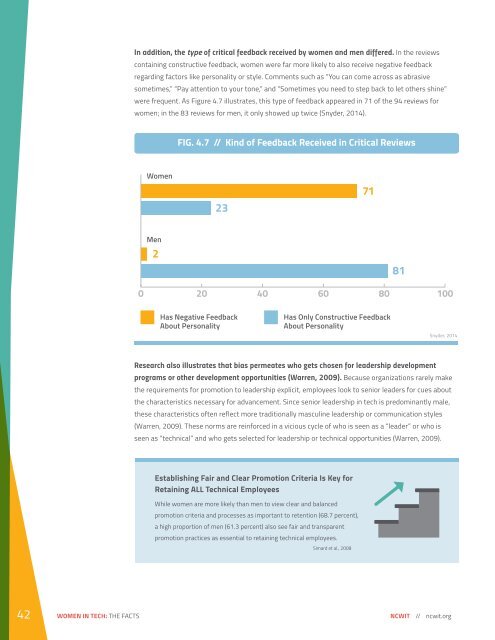WOMEN IN TECH THE FACTS
womenintech_facts_fullreport_05132016
womenintech_facts_fullreport_05132016
You also want an ePaper? Increase the reach of your titles
YUMPU automatically turns print PDFs into web optimized ePapers that Google loves.
In addition, the type of critical feedback received by women and men differed. In the reviews<br />
containing constructive feedback, women were far more likely to also receive negative feedback<br />
regarding factors like personality or style. Comments such as “You can come across as abrasive<br />
sometimes,” “Pay attention to your tone,” and “Sometimes you need to step back to let others shine”<br />
were frequent. As Figure 4.7 illustrates, this type of feedback appeared in 71 of the 94 reviews for<br />
women; in the 83 reviews for men, it only showed up twice (Snyder, 2014).<br />
FIG. 4.7 // Kind of Feedback Received in Critical Reviews<br />
Women<br />
23<br />
71<br />
Men<br />
2<br />
81<br />
0 20 40 60 80 100<br />
Has Negative Feedback<br />
About Personality<br />
Has Only Constructive Feedback<br />
About Personality<br />
Snyder, 2014<br />
Research also illustrates that bias permeates who gets chosen for leadership development<br />
programs or other development opportunities (Warren, 2009). Because organizations rarely make<br />
the requirements for promotion to leadership explicit, employees look to senior leaders for cues about<br />
the characteristics necessary for advancement. Since senior leadership in tech is predominantly male,<br />
these characteristics often reflect more traditionally masculine leadership or communication styles<br />
(Warren, 2009). These norms are reinforced in a vicious cycle of who is seen as a “leader” or who is<br />
seen as “technical” and who gets selected for leadership or technical opportunities (Warren, 2009).<br />
Establishing Fair and Clear Promotion Criteria Is Key for<br />
Retaining ALL Technical Employees<br />
While women are more likely than men to view clear and balanced<br />
promotion criteria and processes as important to retention (68.7 percent),<br />
a high proportion of men (61.3 percent) also see fair and transparent<br />
promotion practices as essential to retaining technical employees.<br />
Simard et al., 2008<br />
42 <strong>WOMEN</strong> <strong>IN</strong> <strong>TECH</strong>: <strong>THE</strong> <strong>FACTS</strong> NCWIT // ncwit.org


